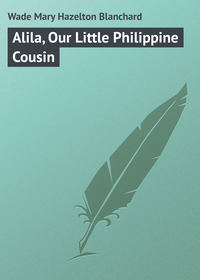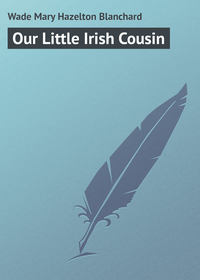 полная версия
полная версияOur Little Turkish Cousin

Mary Hazelton Wade
Our Little Turkish Cousin
In Europe and Asia there are two countries separated from each other by a narrow strip of water. One of these is spoken of as Turkey in Europe, and the other as Turkey in Asia. They are held together under one ruler called the Sultan. He has absolute power over his people, and can do with them as he likes. One word from his lips is enough to cause the death of any of his subjects. None dare to disobey him.
It is because his rule is not the best and wisest, and also because his kingdom is always in danger from the countries around it, that the Sultan is often spoken of as "The Sick Man of Europe."
Our little Turkish cousin lives in the city of Constantinople, not far from the Sultan's palace. He does not understand why some of his people live in wealth and luxury, while so many others spend their lives in begging for the food and clothing they must have. He has no thought but that the Sultan of Turkey is as great and noble as the ruler of any other land.
The child is brought up to love ease and comfort, the daintiest food and the richest clothing. He feels sorry for the poor and the homeless, but he does not know how to truly help them. He hears little about other countries where every one is free and can claim just treatment as his right. But as he grows older he may, perhaps, think for himself, and do some noble deed to save his country and make his people better and happier.
Let us open the doors of our hearts to him, and let him feel our love and sympathy.
CHAPTER I
OSMAN
Of course Osman cannot remember his first birthday. He is a big boy now, with brown eyes and soft, dark hair. Ten years have rolled over his head since he lay in the little cradle by the side of his mother's grand bedstead.
He made an odd picture, – this tiny baby in cotton shirt and quilted dressing-gown. His head was encased in a cap of red silk. A tassel of seed-pearls hung down at one side. Several charms were fastened to the tassel. His mother thought they would keep harm and danger away from this precious baby boy.
He could not have felt very comfortable. His nurse had straightened out his arms and legs, and bound them tightly with bandages. After dressing him, she placed him in his little bed and covered him with several quilted wrappers. Last of all, a thin, red veil was spread over this little Turkish baby.
Do you think he could have enjoyed himself very much? I don't.
He was ready for visitors now. First of all, the proud and delighted father must come in to see his child. A boy, too! The grave man was doubly pleased when he thought of this. As he looked for the first time upon the tiny form done up in so many wrappers, he could hardly tell whether the boy was big or little, fat or thin.
He bent down over the cradle and lifted the child into his own strong arms. Holding him tenderly, he carried him from the room. He stopped just outside the door. There he stood for a few moments while he repeated a short prayer and whispered the name "Osman" three times in the baby's ear.
This was the only christening the Turkish boy would ever receive. Osman would be his name for the rest of his life; and a fine name it was, his mother and friends all agreed.
When the baby was three days old, there was a grand celebration at his home.
Certain old women, called "bringers of tidings," went from one house to another where the lady friends of Osman's mother had their homes. Wherever they stopped, these old women left bottles of sherbet made of sugar-candy, spices, and water. As they presented the sherbet, they told of the good news about the new baby, of the name his father had given him, and of the feast to be held at Osman's home.
"Do come, do come. You will surely be welcome. You will be glad to see the child and rejoice with his mother."
In this way the invitations were given; and so it happened that many ladies found their way to Osman's house on the day named. No special hour was set for their visit. But, from morning till night, people were coming and going.
It was easy enough for passers-by to know something of interest was taking place inside. They could hear the band of music playing lively airs as the ladies drove up to the door and entered the house.
All the visitors wore long cloaks, with veils over their faces, hiding everything except their soft, dark eyes. For it is still the fashion in Turkey that no lady shall be seen away from her home with her face uncovered.
Very few of these visitors came alone. They were attended by their slaves and servants, laden with baskets. These baskets were very pretty. They were trimmed with flowers and ribbons, and filled with all sorts of delicious sweets.
Of course they were presents for the new baby's mother. She lay in her grand state bed, smiling softly as the ladies came up, one by one, to greet her. Before they entered her chamber, they took off their veils and cloaks in an outside room.
"Mashallah! May the child live long and be happy," said the visitors, as they bent over the young mother. At each kind wish, she kissed the hands of the speaker. This was her way of thanking them. Strange to say, the ladies seemed hardly to notice the baby himself, in whose honour they had come to the house.
Do not think for a moment they had forgotten the tiny bundle done up in quilted cotton. No, indeed. But the anxious mother believed some bad fortune might come to Osman if he were examined too closely. She would worry if her friends should fondle the child or pay him much attention.
This is the reason most of them pretended not to see him. A few, however, were so curious they could not resist stopping for a moment at the cradle. But, instead of saying, "Oh, the darling little fellow!" or, "What a bright-looking child!" or other kind words, they exclaimed, "The ugly little creature!" "What stupid eyes he has!" or some such unpleasant thing.
Would you believe it? Osman's mother seemed really pleased as she listened. She said to herself, "Well, if they praised my child, I should think they were trying to hide some bad wish. That very wish would bring an accident to my darling, sooner or later. No, I like best to hear them speak as they do. I know they do not mean what they say."
The visitors were in no hurry to leave Osman's home. They made themselves comfortable on the soft couches. They laughed and chatted together while they ate ices and rich cakes, and sipped coffee or sherbet.
The refreshments were of many kinds, for the baby's father was rich and held a high office under the Sultan, as the ruler of Turkey is called.
If Osman had been born in a poor family, his parents would have had a celebration just the same. The feast would not have been as rich, but coffee and fruits would have been served, at any rate, and the visitors would probably have enjoyed themselves just as much.
When Osman was eight days old, there was another great ceremony at his house. He received a bath. The ladies who were invited could join in the bath if they liked, as well as his mother. There would be music and refreshments and a general good time.
The baby was bathed first. His mother's turn came next.
A Turkish bath is not like that of other people, as perhaps you have heard. A long time is spent before it is finished. On this great day in Osman's life, it was even longer than usual. Many songs were sung, and the visitors stopped several times to eat refreshments.
All this sounds odd to us, but the rich ladies of Turkey have little to do except to ride and make calls, bathe in their own homes or at the public bath-houses, meet together for picnics or some entertainment.
Osman grew so fast it seemed to his mother only a short time before he was able to toddle about without the help of his nurse. The carpets were soft and thick, so he did not get hurt even if he fell. The beautiful colours of the carpets amused his baby eyes.
He was awake every morning soon after sunrise, but this did not trouble his parents. They were early risers, too. The boy's father liked to have plenty of time for sipping coffee and smoking his pipe before leaving home for the day.
There was no such thing as breakfast. The family ate only two real meals in the whole day. But the early morning was a pleasant time. There was no jumping up from the table after a hasty meal. There was no rushing for the train after a hurried kiss and goodbye to wife and baby. Oh, no, none of these things are done in Turkey.
Osman's father dressed himself in a comfortable, loose gown, and seated himself cross-legged on a rug. He clapped his hands and a slave appeared with the steaming coffee, which was placed on a low stand near by. Then the baby's mother poured out the coffee and, handing it to her husband, sat down on a cushion at his feet.
Osman, still in his nightclothes, toddled about, nibbling a sweet-cake.
The slave who had brought the coffee was now busy in tidying the room. First of all, mattresses and wadded coverlets must be stowed away in a cupboard. There was no bedstead. Such a clumsy piece of furniture had been used in the house but once. That was when the young mother lay in state to receive her friends when Osman was born.
Would you believe it! the baby's mother was still wearing her wadded night-dress. She often kept it on for hours after she got up in the morning.
"It is so comfortable," she thought. "Why should I hurry to dress myself for the day?"
After the coffee, the father took his pipe and lighted it with a tiny piece of charcoal. Now for a comfortable smoke. As he puffed away at his pipe, the room was quiet except for little Osman's prattle. He was trying to tell his father and mother about his play-things.
After a while the sober Turk laid down his pipe, and said, "It is time for business."
The dressing-gown was taken off, and street clothes were put on. What a grand-looking gentleman he was now, with his long beard hanging over his snow-white shirt-front, his embroidered vest, and wide, loose trousers.
He lifted Osman up for a kiss, and, with a deep bow to his wife, he left home for the day.
CHAPTER II
SCHOOL
"Mamma, mamma, I am so glad it has come at last!" said little Osman, early one bright spring morning.
"Yes, yes, my darling," answered his mother. "It is a good time; I am glad, too."
What made Osman wake up sooner than usual this morning? What caused his eyes to look so bright? Why was the nurse taking such pains with his hair and dress?
He was going to school for the first time in his life. His sixth birthday had come and gone, and his father had said:
"It is time for my little boy to do something besides play. He must learn to read our good books, and understand the use of numbers."
The important day was set and the teacher was told about the new pupil. Word was also sent to the priest.
Osman's father spent some time in choosing a pony on which his boy should first ride to school. At last he decided on one of an iron-gray colour and very handsome.
"What beautiful trappings!" exclaimed Osman, when the pony arrived at the door. "Oh, you dear, kind father to get them!"
Any boy would be pleased to ride on a pony decked out in such a gay manner.
The pony had no sooner arrived than the whole school appeared at the door. The children were dressed in their best clothes to do honour to the new pupil.
The priest took his place in front of the young company. They instantly bent low while he made a short prayer. After this, Osman was lifted to the back of the pony, the other children formed in double line, and the procession started out for the school.
But it did not move quietly. Hymn after hymn was sung by the little ones in strong, clear voices as they went along.
The grown-ups whom they passed smiled and said to themselves, "A child is on his way to school for the first time. It is a glad day. May he grow wise and be happy."
What an odd-looking schoolroom it was that Osman soon entered; neither seats nor desks could be seen. Three divans, as the big, soft Turkish couches are called, stood along the wall. The children squatted cross-legged on these, side by side.
After they had taken their places, the teacher sat down in front of his little class and began to hear their lessons.
Each child had by this time opened his book and begun to recite. Not one of them at a time. Oh, no, indeed! They spoke together in high, sharp voices. How could the schoolmaster understand what they said?
He did not seem to have any trouble, however, and kept the children busy. They read from the Koran, which is the sacred book of their people, they recited numbers, and they wrote.
You remember they had no desks. The poor little things had to hold their copy-books in their laps, and it was tiresome work. Their pens were made of reeds, and sponges took the place of ink-wells.
Before the children were dismissed, the master told them a story which interested Osman very much.
"I will repeat it to my mother," he said to himself. "The story teaches us not to seem surprised, no matter what may happen. My father has spoken of this very thing. It is not polite to be astonished. That is what he has often said."
As the little boy rode homeward, he saw a man sitting cross-legged at the street corner. Two veiled women stood in front of him. They were eagerly watching the man as he wrote. From time to time he stopped as one of the women told him something more she wished him to put into the letter.
"He is a street scribe," thought Osman. "They will pay him for that letter. They do not know how to write. That is why they get him to do it. How quickly he makes the letters, and how easily he holds his pen. I hope it won't be long before I can write as well as he does."
Such a scribe is often seen in the streets of Constantinople, the city where Osman lives. There are many people there who can neither read nor write. Fine ladies are not ashamed to stop at a scribe's little stand and ask him to write letters for them, as these people were doing.
Osman's school was only a short distance from home, and he was soon at his own gate. The moment he arrived, the door was opened by an old black slave, who had been watching for the darling of the house.
"I'd like to stop and tell you what I've been doing this morning, but I can't now," said Osman. "I must tell mother first."
The little boy ran up the stairs to his mother's rooms. In another moment he was seated on a divan beside her and talking faster than one often hears among the quiet people of his country.
Lunch was soon brought, and, you may be sure, the little boy was ready for it. There was a dish of pilaf, of course. It was made of nicely cooked rice and butter, and was delicious. Then there was a juicy melon, and fresh figs, besides cakes sweetened with honey, candy, and many other nice things.
Osman's mother is as fond of sweet things as her little boy, and she is ready to eat them at any time. The lunch was served at an odd little table. Indeed, it could hardly be called a table, – it was a small, low stand, about eight inches above the floor. The dishes were brought in one at a time, and placed on the stand.
Osman and his mother ate the pilaf with their fingers, from the same dish. But they did not hurry. The grains of rice were picked up so daintily with their finger-tips, they were hardly soiled by the touch of the food.
"We will wash now," Osman's mother said, as the lunch was finished. A queer basin was at once brought by a servant, and held in front of the lady. In the middle of the basin was a little stand holding a cake of soap, while underneath was a sort of well. This was to receive the water as it left the basin. As Osman's mother held out her hands, one servant slowly poured the water over them, while another held an embroidered towel ready for her use.
It was Osman's turn next. No matter how much he wished to hurry out to play, he must not rise from his cushion till his hands were bathed.
"Wash before eating and afterward," is a law of the Koran. Osman thinks it would be as wicked to break this rule as to tell a wrong story, or take anything belonging to another.
As soon as the hand-washing was over, the little boy started for the courtyard to watch his tame pigeons and play with his friend Selim.
Osman's house is divided into two parts. His father's rooms are down-stairs. A separate door leads into them from the street. No woman ever enters these rooms. Even the servants who take care of them are men. The boy's father receives his gentlemen friends in this part of the house. It is here that he talks over business with his visitors. Sometimes he holds dinner-parties in these rooms, but they are only for men. He even has a separate courtyard and garden. Osman may come here if he likes, but the real home of the family is up-stairs in his mother's rooms.
This part of the house is very beautiful. Rich curtains hang in the doorways. Soft and heavy rugs are placed here and there on the floors. Divans with soft cushions stretch along the sides of the walls, under the latticed windows.
Yes, every window is covered with lattice-work, so that no one passing along the street below can see the faces of the persons within these upper rooms.
This is the fashion of the country. Poor women of Turkey! They seem to us almost like prisoners, but they have been brought up to think of their life as the most natural and best in the world. They may go outdoors whenever they like, so long as a veil is worn over the face. But no man, unless he is a very near relative, must enter the part of the house where the women and children have their home.
CHAPTER III
THE FIRE
"Listen, listen, Osman. What is all the noise about?" exclaimed Selim. It was toward the end of the afternoon, and both boys were growing tired of play.
"It's a fire. Don't you see the police? They are hurrying along with pails of water on their heads. Then, look quickly down the street! Smoke is coming out of that building. Let's ask nurse to go with us."
In another moment Osman had run into the house and out again, with old black Fatima trotting after as fast as she could move. She hurriedly pulled her veil over her face. Then, taking each boy by the hand, she led them through the gate, and joined the crowd of people who were going in the direction of the fire.
Everybody looked gay and happy. Why shouldn't they have a good time? The fire did not happen through any fault of theirs. It would be a grand sight, and the onlookers might as well enjoy it.
There were no fire-engines in the city. The policemen brought pails of water, but these did little good.
And now, not only columns of smoke are bursting through the windows and doorways, but flames are leaping and dancing along the openings. See! Those who are still inside the burning house are throwing out cushions and mats, curtains and pillows, into the street. Such furnishings can be saved, even if the building is destroyed.
The watching crowd seize these articles and at once make themselves comfortable. A number of women sit down on a pile of soft rugs and prepare to enjoy the show, as if they were at the theatre. Not far off is a group of men, who stand chatting and smoking. The balconies of neighbouring houses are filled with gazing crowds.
The street peddlers soon begin to arrive. They bring trays of sweetmeats, sherbets, and other good things. As they elbow their way through the crowd, they act as though the fire had been started on purpose to give them a chance to sell their goods.
Still the fire rages; the timbers creak; the walls begin to totter; the roof gives way, and falls inward with a crash. In a few moments more, only a heap of charred wood is left in the place of a fine house.
It might have been saved if firemen could have been here with their engines. But they are unknown, as yet, in this great city of the Turks, where many buildings are destroyed by fire every year.
"Come, come, children," said Fatima, "it is late. The shadows are beginning to fall. Osman, your father is surely home by this time and will wonder where you are."
While the old woman hurried the boys along, they ate fig-paste they had bought of a peddler.
No doubt you, children of other lands, have eaten fig paste, too. But perhaps you have never thought of the people who invented it. It is a Turkish sweetmeat, and Osman thinks it is delicious when freshly made by a candy merchant in his city.
"The fire has waked up every dog in this quarter," said Fatima, fretfully, as she hurried the children along. She was right in saying so, for "Bow-wow-wow, bow-wow-wow," could be heard in every direction. Even as she spoke, the old nurse stumbled against a big dog that was rushing past her and barking furiously.
"Hurry up, old fellow! Catch him, catch him!" cried Osman, turning around to watch. "Fatima, don't you see what is the matter? He is driving a strange dog out of the street. I hope he will succeed."
Just as Osman spoke, a half-dozen other dogs came tearing along, eager to join in the chase. There was small chance for the stranger, who was now running with all his might. His tongue was hanging from his mouth, and his tail was thrashing from side to side between his legs.
Poor homeless dogs of Constantinople! There are thousands of them. Yes, it is the very truth. There are scores of thousands of them.
Those big, gaunt, yellow creatures live in the streets and byways, under the door-steps and in the graveyards. They feed on the garbage thrown out from the kitchens, but sometimes get a little choicer food through the kindness of the people.
"Kill a dog without real need of doing so! No, no," Osman's father would say, very solemnly. "It is the law of our religion that we should kill nothing living if we can possibly help it. Let the dogs live.
"Besides, they are useful creatures. They keep our streets clean of all decaying matter. By doing this, fevers and many other kinds of illness are prevented. The poor animals are a real blessing."
"I know where there are some new-born puppies," said Selim, as he was leaving Osman for the night.
"Where? Let's go and see them now. Is it near here?" cried his little friend.
"Yes, it's only a few steps."
"No, no, children," broke in Fatima, "you ought to be in your own homes this very moment. Wait till morning, and I will go with you before school-time."
"Are their eyes open yet? Does their mother seem fond of them? How many are there?" asked Osman.
But Fatima did not give Selim a chance to answer. She had already rung the bell at the door of his house, and a servant had appeared to take charge of him.
So, without stopping for anything except a kind wish to Selim for his peace and happiness, she led her own little charge home. His father had reached there before him, and was all ready to talk over the day's doings with his only child.
As the Turk sat smoking that evening, Osman described the fire he had seen, and told of the hunted dog he had met on the way home.
"He ought to have known better than to come into a strange quarter," said the boy. "It was all he could expect. Any dog that remains at home is not troubled by the others. I love the creatures; don't you, papa? They are gentle and quiet and clever."
"Yes, Osman, the city would not seem like home without our yellow-haired dogs. Before you were born, however, the Sultan thought it would be wise to clear our streets of them. Great numbers were taken to an island near the coast."
"Did they die there from want of food, papa?"
"Oh, no. They were too wise to stay there and starve. They all swam back to the city. Our people were so pleased, the dogs have never been troubled since then."
"I love the dogs because they are not only gentle, but they do not forget a kindness. They are grateful creatures," said Osman's mother. "I have a friend who told me the story of an English lady living here in our city. She had a small terrier she had brought back with her after a visit to England.
"I suppose, Osman, you know that our dogs are always ready to attack one of a different breed?"
"Yes, mamma."
"Well, it happened one day that this little terrier escaped from his home and got out into the street among the dogs of the city."









